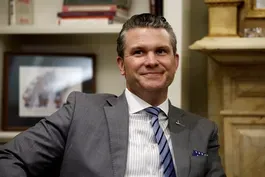
Uncertainty looms over Israel’s fragile truce in Lebanon
Clip: 1/25/2025 | 8m 19sVideo has Closed Captions
Uncertainty looms over Israel’s truce in Lebanon ahead of troop withdrawal deadline
There was jubilation in Israel, Gaza and the West Bank on Saturday as hostages and Palestinian prisoners were freed in the latest advance for the Israel-Hamas ceasefire. Meanwhile, Israel’s fragile truce in Lebanon appears to be in doubt as this weekend’s deadline to withdraw Israeli troops from the country looms. Special correspondent Simona Foltyn reports.
Major corporate funding for the PBS News Hour is provided by BDO, BNSF, Consumer Cellular, American Cruise Lines, and Raymond James. Funding for the PBS NewsHour Weekend is provided by...

Uncertainty looms over Israel’s fragile truce in Lebanon
Clip: 1/25/2025 | 8m 19sVideo has Closed Captions
There was jubilation in Israel, Gaza and the West Bank on Saturday as hostages and Palestinian prisoners were freed in the latest advance for the Israel-Hamas ceasefire. Meanwhile, Israel’s fragile truce in Lebanon appears to be in doubt as this weekend’s deadline to withdraw Israeli troops from the country looms. Special correspondent Simona Foltyn reports.
How to Watch PBS News Hour
PBS News Hour is available to stream on pbs.org and the free PBS App, available on iPhone, Apple TV, Android TV, Android smartphones, Amazon Fire TV, Amazon Fire Tablet, Roku, Samsung Smart TV, and Vizio.
Providing Support for PBS.org
Learn Moreabout PBS online sponsorshipJOHN YANG: Good evening.
I'm John Yang.
Jubilation in both Israel and Gaza today as hostages and Palestinian prisoners were freed in the latest advance for the fragile Israeli-Hamas ceasefire.
In Gaza City, there was a highly choreographed transfer of four young female Israeli soldiers from their Hamas captors to the Red Cross.
Later, at a hospital in Israel, they were reunited with families.
There were similar reunions in Gaza and the West bank for 200 freed Palestinian prisoners.
15 months of war meant many had no homes to return to.
A threat to the truce arose today when Hamas didn't release of female civilian hostages said it would.
In response, Israel said it would not allow displaced residents to return to northern Gaza as it had agreed to.
Meanwhile, on Israel's northern front, Israel said it would keep troops in Lebanon beyond this weekend's deadline to withdraw as part of the ceasefire with Hezbollah.
They said Hezbollah and Lebanon haven't kept their end of the deal.
Special correspondent Simona Foltyn is in Lebanon.
SIMONA FOLTYN (voice-over): In the ruins of Nabatieh.
Hezbollah's flag still flies high despite the devastation in Lebanon's south.
The war with Israel is considered a victory.
Bread and high fives are distributed to celebrate and to honor the sacrifice.
Abbas is an ardent supporter of Hezbollah, the Resistance, as it's called here.
He's holding a picture of the group's late leader, Hassan Nasrallah, killed in an Israeli strike last September.
ABBAS KHOMEINI, Hezbollah Supporter (through translator): The damage will be compensated.
We lost the person next year to us, Saeed Hassan Nasrallah, that's the main loss.
May God protect Resistance.
We won.
If it wasn't for them, we wouldn't be in Nabatieh.
SIMONA FOLTYN (voice-over): But for all the talk of victory, it's undeniable that Hezbollah's heartland has been hit hard.
There's a feeling here that Israel hasn't just been targeting the group's fighters, but punishing its supporters as well.
Much of Nabatieh's historic market is no more.
In the burned out shell that was once his shop, I met Mohammed Jaber.
MOHAMMED JABER, Shop Owner (through translator): I put a lot of effort into this shop.
It was distinguished in Nabatieh by its look and character and location.
SIMONA FOLTYN (voice-over): In the words of Nasrallah, Lebanon was supposed to be a support front to help its ally, Hamas.
But it turned into a major battleground, a miscalculation that cost Lebanon dearly.
This is the only one of Mohammed's four shops standing still.
He's careful to criticize his Hezbollah.
MOHAMMED JABER (through translator): We were surprised when the front opened.
They called it a support front, but I mean, we would have been better off without it, because in the end the front came to us.
Maybe this destruction wouldn't have happened.
Maybe.
Or maybe the Israelis would have finished Gaza and then come here.
SIMONA FOLTYN (voice-over): The market was also damaged in the 2006 war.
Back then, Mohammed got financial support from Hezbollah.
The group has again promised compensation, which comes from its main backer, Iran.
Mohammed has yet to receive it.
MOHAMMED JABER (through translator): We didn't know anything until now.
They say that Hezbollah and the state will compensate, but until now, nothing is clear.
SIMONA FOLTYN (voice-over): By chance, we ran into Lebanon's environment minister touring the city.
Nasser Yassin is also responsible for the government's emergency response.
NASSER YASSIN, Lebanon's Environment Minister: What we see here in the heart and the downtown of Nabatieh.
Nabatieh is the main city of this district.
And you see this is all commercial, this is all civilian.
This is clearly an urban site.
The attack by the Israeli forces on this city and in other parts of Lebanon was clearly an attack on civilians, attack on everything that's related to the everyday life of the Lebanese.
SIMONA FOLTYN (voice-over): More than 100,000 houses have been destroyed across Lebanon, and the Israeli army continues demolitions in the areas it still occupies.
NASSER YASSIN: The level of destruction, the aggression of the Israeli forces, the firepower of the message used, is unprecedented for a country that's been through wars.
But this is really unprecedented.
SIMONA FOLTYN: This is what towns and villages across southern Lebanon look like.
But despite the widespread damage, Hezbollah has portrayed itself as the victor of this war.
Now, even here in Lebanon's south, where Hezbollah enjoys widespread support, not everybody agrees, though people don't dare to criticize the group on camera.
I spoke to one shop owner who told me that this war has been a huge loss for Lebanon and the Hezbollah has been weakened not just militarily, but also politically.
SIMONA FOLTYN (voice-over): The election of Lebanon's new president earlier this month is a sign of these shifting political winds.
Former army commander Joseph Aoun was favored by the United States, but had long been opposed by Hezbollah's political wing.
His appointment ended two years of political stalemate and showed that Hezbollah's influence has diminished.
Aoun pledged to implement Lebanon's fragile ceasefire deal with Israel and to ensure that the Lebanese army replaces Hezbollah as the dominant armed actor.
JOSEPH AOUN, Lebanese President (through translator): I will make sure that the country, and only the country, will carry weapons.
SIMONA FOLTYN (voice-over): The remark was met with applause.
But Hezbollah has resisted disarmament in the past.
The even bigger challenge for Aoun may be to force the IDF to withdraw from southern Lebanon in line with the deal.
And then there's the human cost of this war, which continues to rise despite the ceasefire.
Since October 2023, Israeli attacks on Lebanon have killed more than 4,000 people, according to Lebanon's Ministry of Health.
That includes hundreds of children.
Many more have been left with life changing injuries.
In a hospital in the eastern Beqaa Valley, I met seven year old Noor.
She survived an Israeli strike in October but suffered brain damage.
She can't see, hear, speak or walk.
ABDULLAH MOUSSAWI, Father of Strike Victim (through translator): She was playing with her cousins when the bomb hit.
Her cousin lost an arm.
All the children were affected.
But unlike her, look at her.
My daughter was very beautiful, very cute, very smart.
SIMONA FOLTYN (voice-over): Noor is her parents only child.
This was her life before the war.
Jumping into swimming pools and doing cartwheels like an ordinary child anywhere else in the world.
Whether or not the ceasefire holds, North's life will never be the same.
Her father blames the United States.
ABDULLAH MOUSSAWI: America is the mother of terrorism.
In Lebanon and in Gaza they are bombing us with American weapons.
I want to tell you something.
Whether it's Muslims, Christians or Jews, we all believe in the afterlife.
We will get our justice there.
SIMONA FOLTYN (voice-over): Hezbollah may have been forced to take a step back, but it still enjoys support among many Lebanese Shia.
One night they gather to commemorate their fallen leader.
Resistance against Israel is deeply ingrained in this community's DNA.
HAWRA BAZI, Hezbollah Supporter (through translator): The way we rebuilt in 2006, we will rebuild again.
We are committed to this path more than were before.
SIMONA FOLTYN (voice-over): Hawra Bazi is the mother of a fallen Hezbollah fighter, a price she's willing to pay again.
HAWRA BAZI (through translator): I raised my son on this approach, and I will raise my grandson the same way.
I will pass on the teachings of Hassan Nasrallah.
SIMONA FOLTYN (voice-over): The latest war between Hezbollah and Israel, however costly, may not be the last.
For PBS News Weekend, I'm Simona Foltyn in Lebanon.
AI transcription tool ‘hallucinates’ medical interactions
Video has Closed Captions
What to know about an AI transcription tool that ‘hallucinates’ medical interactions (5m 53s)
The effect of removing medical debt from credit scores
Video has Closed Captions
The effect of removing medical debt from millions of Americans’ credit scores (7m 4s)
News Wrap: Hegseth sworn in as Trump’s defense secretary
Video has Closed Captions
News Wrap: Pete Hegseth sworn in as Trump’s defense secretary (2m 15s)
Providing Support for PBS.org
Learn Moreabout PBS online sponsorshipMajor corporate funding for the PBS News Hour is provided by BDO, BNSF, Consumer Cellular, American Cruise Lines, and Raymond James. Funding for the PBS NewsHour Weekend is provided by...















